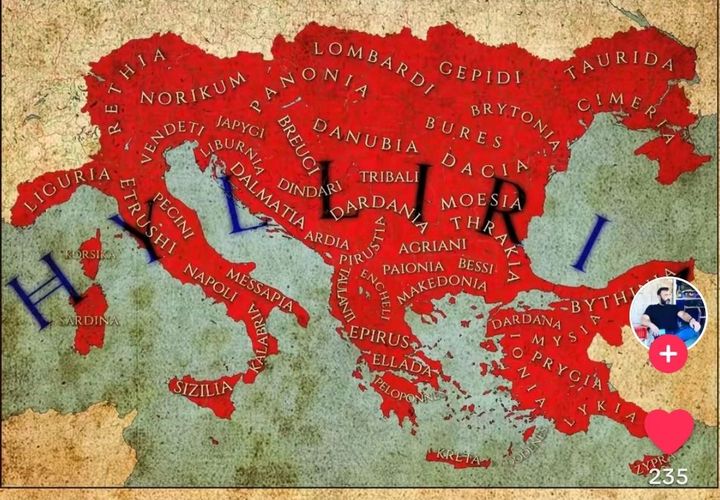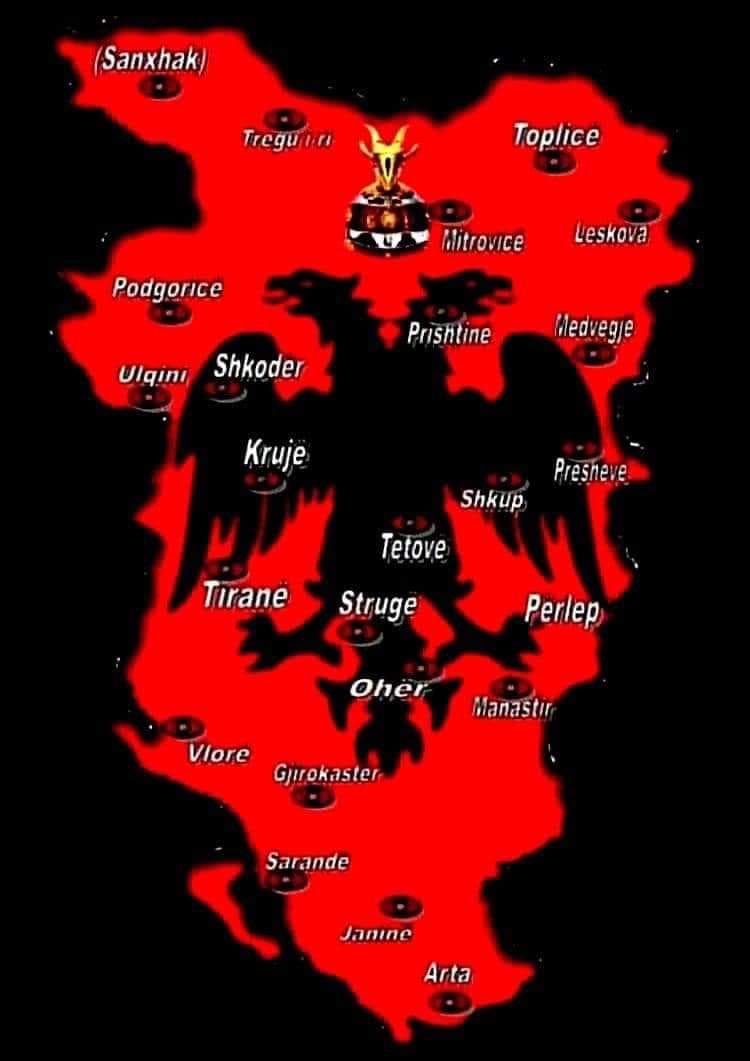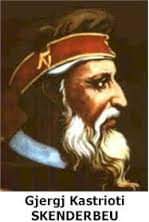(The first map of a new state.)
Thank you for reading this post, don't forget to subscribe!
From leading Albanian sources, we have been provided with the first map published by the Albanian Independence Committee, showing the extent of the future Albanian state. Our readers are thus able to get an impression of this newest European state, currently in the process of formation, whose establishment is taking place under such difficult conditions.
As can be seen from the map, the Albanians hope that the Great Powers will assign them a fairly extensive territory, stretching along the Adriatic coast from the Montenegrin border in the north to Arta in the south. The Albanian Independence Committee, which has already constituted itself as a provisional government, claims, as further visible on the map, an eastern border that encompasses a number of cities that is currently held by Serbian troops.
Therefore, if the Albanian wishes are to be fulfilled according to the will of the Great Powers, the Serbs will have to vacate the cities they have conquered by force, such as Mitrovitza, Prizrend, Uskub, Monastir, and others. Janina, which has not yet fallen, is also to be incorporated into the new Albanian state. Elbasan, which the Montenegrins could not conquer despite their siege, is also claimed by the Albanians.
On the Adriatic coast of the new state entity lie the most important ports, San Giovanni di Medua, Durazzo, and Balona (erroneously referred to on the map as Valona).
The discussion about the Albanian question is now beginning at the authorized peace negotiations in London. The Turks are going to London with the hope that they will escape with minor losses and settle everything with a few border adjustments, while the Balkan states are convinced that the division of Turkish spoils will be very thorough.
How these developments will end, of course, cannot be foreseen; however, it seems certain that neither the hopes of one side and those of the other side may still be fulfilled. The decisive word will be spoken by the Great Powers, and it should not be forgotten that the Great Powers upheld the system of the status quo during the hostilities and only abandoned it when the victorious advance of the Balkan Alliance quickly and impetuously marched toward Constantinople.
Meanwhile, the Chataldja line, which the Turks have drawn around their capital, has held; the attack of the victors was brought to a halt, and from that moment onward, the chances of the Turks have improved day by day.
It is therefore not so unlikely that the previously dismissed idea of the status quo will come back to life, which might still provide the Turks with advantages they could no longer expect. As things stand, Turkey will not be able to prevent the autonomy of Albania.
Significant for the future relationship between Albania and its former motherland is a telegram sent by Ismail Kemal Bey, the provisional President of Albania, to the Grand Vizier a few days ago. In this telegram, he formally apologizes for the proclamation of independence and asks the Porte not to withhold support for the Albanians in defending their national rights.
The Albanians clearly intend to dissolve the Turkish alliance, and even if they sever the old bond, they aim to establish a new one at the same time. Turkey will hardly refuse this alliance with Albania and may even step forward as the protector of Albanian independence.
—
Source:
Wie aus der Karte zu entnehmen ist, hoffen die
Albanesen, daß ihnen die Großmächte ein ziemlich
ausgedehntes Gebiet zusprechen werden, das sich
längs der adriatischen Küste von der montenegrin-
ischen Grenze beginnend bis nach Arta im Süden
erstreckt. Das albanische Unabhängigkeitsausschluß, das
sich bereits als provisorische Regierung
konstituiert hat, beansprucht, wie weiter aus der
Karte zu ersehen ist, eine östliche Grenzlinie, die
Reihe von Städten in sich schließt, welche gegen …
wird von serbischen Truppen besetzt gehalten wer-
den. Wenn sich daher nach dem Willen der Groß-
mächte die albanischen Wünsche erfüllen werden,
müssen die Serben die von ihnen mit Waffengewalt
eroberten Städte Mitrovitza, Prizrend, Uesküb, Mo-
nastir u. a., wieder räumen. Auch Janina, das
bisher nicht gefallen ist, soll dem neuen albanischen
Staate einverleibt werden. Elbasan, das die Monte-
negriner trotz der Belagerung nicht erobern konn-
ten, beanspruchen die Albanesen ebenfalls für sich.
An der adriatischen Küste des neuen Staatsgebildes
liegen die wichtigsten Hafenplätze San Gio-
vanni di Medua, Durazzo und Balona
(auf der Wiedergabe der Karte irrtümlich Valona).
Die Diskussion über die albanische Frage beginnt
jetzt bei den bevollmächtigten Friedensverhandlungen
in London. Die Türken gehen mit der Hoffnung
nach London, daß sie mit einem blauen Auge davon-
kommen und mit einigen Grenzregulierungen alles
erledigen werden, während die Balkanstaaten über-
zeugt sind, daß die Aufteilung der türkischen Beute
sehr gründlich ausfallen werde. Wie die Wirksam-
keiten enden werden, läßt sich natürlich nicht vor-
aussehen; soviel scheint aber sicher, daß weder die…
Hoffnungen des einen noch jene des anderen Teiles erfüllt werden dürften.
Das entscheidende Wort wer-
den die Mächte sprechen, und da darf man nicht
vergessen, daß die Mächte noch während der Dauer
der Feindseligkeiten das System des Status
quo aufrecht erhielten, von dem sie erst abrückten,
als der Siegzug der Balkanerbündelung eilig un-
gestüm gegen Konstantinopel losging. Inzwischen
hat aber der Tschataldschispang, den die Türken um
ihre Hauptstadt gezogen haben, standgehalten; der
Ansturm der Sieger wurde zum Stehen gebracht,
und von diesem Augenblicke an haben sich die Chan-
cen der Türken von Tag zu Tag gebessert. Es ist
demnach nicht so unwahrscheinlich, daß der totge-
sagte Gedanke des Status quo wieder lebendig wird,
woran die Türken noch Vorteile ziehen könnten, die
sie nicht mehr erwarten durften. Wie die Dinge stehen,
wird die Türkei der Autonomie Albaniens nicht
hindern können. Bezeichnend für das künftige Verhält-
nis Albaniens zum alten Mutterlande ist ein Tele-
gramm, des Ismail Kemal Bey, der provisorische
Präsident Albaniens, dieser Tage an den Großwesir
gerichtet hat. Er entschuldigt sich in dieser Depesche
förmlich wegen der Ausrufung der Unabhängigkeit
und ersucht die Pforte, den Albanesen bei der Ver-
teidigung ihrer nationalen Rechte die Unterstützung
nicht zu versagen. Die Albaner wollen also offenbar
das Türkenbündel lösen, und wenn sie auch das alte
Band zerreißen, so soll doch gleichzeitig ein neues
angeknüpft werden. Die Türkei wird den albanischen
Bundesgenossen kaum abweisen und selbst als Be-
schützerin der albanischen Unabhängigkeit in die
Schranken treten


Shënim:
Redaksia, diplomacia. dk nuk e merr përgjegjësinë për pikëpamjet e autorit në shkrimin e botuar!
Respekt!
